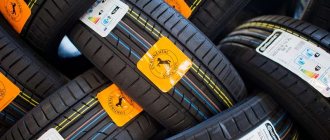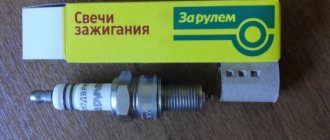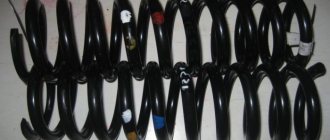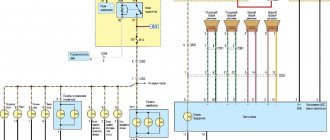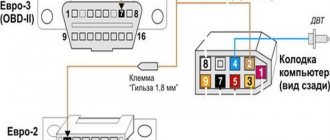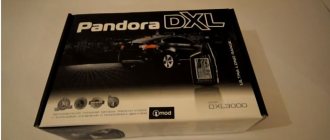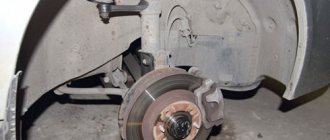Stripes can be of different widths, colors and locations. But they have one common characteristic feature. Please note: the stripe always goes along the entire circumference of the tire. This ensures that paint never gets into the grooves. What kind of painter is this who is not too lazy to paint like this “artistically” on each tire?
If the nozzle sprayed paint onto the rotating tire, the stripes would fit perfectly. And these are not applied quite evenly. Does this mean they are applied by hand?
If the nozzle sprayed paint onto the rotating tire, the stripes would fit perfectly. And these are not applied quite evenly. Does this mean they are applied by hand?
What do yellow dots or triangles on tires mean?
The yellow dot on a tire is one of the most common markers, so we start with its description. Thus, based on static balancing, the lightest place on the car tire is established. To understand why this is needed, you need to find the L marking on the sidewall of the rubber.
Thus, we will install the easiest place indicated by the manufacturer. The yellow marker, in turn, will be on the exact opposite side. But there are times when the factory does not put the letter L on the tire.
In such a situation, we place it as follows: the yellow mark should be located next to the nipple through which pumping occurs. This is useful in cases where we need to balance the tire and use as few additional weights as possible.
When to use color stripe markings
There is nothing secret about the color mark in question: it is not interconnected with the level of product quality, but is additional information about how exactly the installation should be carried out. Modern regulations (GOST 4754) contain a recommendation for the presence of a balancing mark. But it is not specified what color it should be. In fact, these are simply additional instructions for tire service employees, which allow them to assemble the wheel and at the same time reduce the size of the balancing weights.
These stripes on tires allow warehouse and sorting center workers to understand what size or type a particular model is. This marking scheme is necessary for tires of the same size, but produced in different periods. Sometimes there are even paired lines.
This is due to the fact that in domestic warehouses tires are often stored in a vertical position, leaning them tightly against each other to eliminate the risk of mechanical damage. So, when storing in the form of stacks, the ribs of the tires are not visible to workers when rearranging. Therefore, in the tread area, manufacturers deliberately apply standard color marks that indicate a specific standard size for the fastest and most convenient identification.
Otherwise, stripes marked in any color and visually noticeable on the tread do not carry important information either for the end consumer or for tire service personnel.
What do red dots and triangles on tires mean?
Colored markings on tires may also be red - what does this mean? As a rule, dots, triangles, and less often circles are applied. They are located opposite the lightest point on the tire and make installation easier for service station workers.
There are situations when the letter L is not on the sidewall. This means that the orange or red mark will be located in the opposite direction from the one where the pumping valve is located.
Red marks
Among others, there is sometimes a red dot on the tire.
The place next to this mark is the heaviest, because this is where the sidewall structure is the most rigid. Scientifically speaking, it is the maximum point of deflection of the radial force. The red triangle mark on the tire indicates the point where the belt layers meet, or the stiffest part of the sidewall. When installing rubber on a wheel rim, the L mark must be aligned with the heavy part, that is, the red mark. Otherwise, it will be quite difficult to “center” the rubber and additional vibrations from the engine and wheels will be felt on the steering wheel.
The question often arises, what to do if there are two colored marks on the tire and they are not located diametrically opposite? In this case, maintenance and repair specialists recommend focusing on the yellow mark, considering the red mark to be of secondary importance.
It is worth saying that the color marks do not carry basic information about the grade or type of tire, but rather represent instructions for proper installation for tire service workers. Therefore, when purchasing tires, you must be guided, first of all, by the technical characteristics of the product, and the presence or absence of color markings is not a critical factor when choosing.
What does a white circle or dot on tires mean?
Unlike the markings described above, white circles (dots) have a slightly different purpose. They are used to indicate the most flexible part of a car wheel tire. Such a mark should be located at an angle of 180 degrees from the lightest part of the tire (it may be designated by the letter L of the Latin alphabet, but it may also not be there).
In contrast, on the sidewall of the tire there may be a white circle in which the manufacturer puts a number. This will be evidence of confirmation of the technical characteristics declared by the manufacturer. If a defect or defect is discovered, it will be easier for the buyer to prove their rights to a replacement or return.
Colored stripes on a tire: how not to buy a defective or fake one (+VIDEO)
There is a theory that red, blue and yellow stripes mark tires of different conditions: good, defective and defective. There is another opinion: you can tell by the colors whether a tire is original or fake. And if you know which combination of colors corresponds to what, you will choose tires that will serve faithfully. And if you don’t know, excuse me, depending on your luck. A new video from tells the truth about the colored marks that adorn the tread and sidewalls of new tires. If watching is uncomfortable, read the text version under the video.
Join us on Instagram, Facebook, VKontakte or Odnoklassniki to stay up to date with news, competitions, discounts and promotions. More interesting information about tires and cars is on our YouTube channel.
What do the digital marks on tires mean?
Numerous digital marks indicate physical characteristics - they must be correlated with the data on the rims in order to choose the right tires. On each such product you can see alphabetic and numerical designations, which are indicated through a fraction.
For example, let's take a set of characters 195/65 R13. The first indicator will tell us that the tire width is 195 mm. The next indicator is the percentage ratio of the tire profile height to its width. And finally, the last entry indicates the wheel diameter required for the mount. This is followed by markings of the speed index and the maximum permissible load.
You should not experiment with the tires of your car, since the manufacturer provides them with a certain set of technical characteristics that these products must meet. In other words, the set values provide specific driving characteristics.
What do the stripes show?
Colored stripes applied around the circumference or reflected on the tread itself (inside the grooves or along) are special markings performed in production during the production of blanks. Now there are several popular versions of what they were originally created for:
- grouping by type of rubber from which the tire is made;
- additional mark from the brand to combat counterfeiting.
- selection of a defective batch of wheels at the company plant.
But in fact, the mentioned strips are used in practice solely for the purpose of quickly identifying modern models and standard sizes in warehouses. Colored lines are applied by default during tread formation: then the rubber sleeve is produced as a continuous strip and then cut according to the specified wheel dimensions.
This mark informs the buyer that the rainbow lines were imprinted on the workpiece precisely before the formation of the tread pattern (before the final stage in the finished product), because indicating the quality of the tire using paint along the entire tread is considered economically impractical.
Red and yellow circles on the wheel cord
The fact is that in production, when a tire comes off the assembly line, it must be balanced. To determine the hardest place and the easiest.
Thus, the hardest place is the red circle
And the easiest thing is yellow
You need to know them when assembling and balancing a wheel at a tire shop. After all, it is opposite the easiest place (that is, the yellow circle) that our nipple or “nipple” (as many call it) is installed.
ABOUT
The material was prepared by the leader of the Belarusian tire market, according to the International Agency MASMI Research Group for 2022.
Addresses of Autoset stores:
- Minsk, st. Radial, 40/2;
- Minsk, st. Umanskaya, 54/1;
- Minsk, st. Promyshlennaya, 2/1;
- Brest, st. Yanka Kupala, 19;
- Bobruisk, st. Ulyanovskaya, 40;
- Vitebsk, Moskovsky Ave., 35;
- Gomel, st. Barykina, 321a;
- Grodno, st. Pobeda, 17B;
- Mogilev, st. Stroiteley, 21;
- Mozyr, per. 1st Berezovy, 16g.
Source
Colored dots
There are also red dots. The myth says that this is the heaviest part of the tire. In fact, this is the location with the largest radius. A tire is never completely perfect, and some part of the tread is slightly higher than the rest of the tread. An experienced tire mechanic will try to reduce the total wheel runout by aligning a small radius spot on the rim with this red dot. The task is quite complicated and requires first “scrolling” the disk separately.
Colored markings on tires are a kind of cheat sheet for warehouse employees, tire mechanics and the car owner. The main thing is to be able to read them.
Source
Longitudinal lines on the wheel tread
Regarding the longitudinal lines on the tire tread, there are many misconceptions - some believe that these are some kind of indicators of transverse rolling when the tire is run in at the manufacturer, others confuse the lines with a wear indicator. In fact, this is just a sign of distinction between tire models, which is used by sorters in product warehouses. Since a lot of rubber is stored there, the sorter uses these lines to determine the batch he needs, which saves a huge amount of time and allows him to avoid mistakes.
Colorful stripes
The number, combination and color of the stripes on the tread mean absolutely nothing to either tire sellers or tire buyers. Likewise, they don’t say anything to tire specialists. But for warehouse workers they are very useful. To understand why colored stripes are applied to the tread, you cannot do without the basics of tire production.
The tire tread is made from blanks - continuous strips several tens of meters long. Before cutting the workpieces into pieces, colored stripes are applied along their entire length. The blanks are cut according to the principle of “one piece – one future tire”. Then the pieces are sent to the assembly line. Here, colored stripes help workers understand which model and standard size a particular piece corresponds to. If there were no stripes, workers could make a mistake because the pieces are very similar in shape and size.
Explanation of markings
Dots, stripes and stamps are used to mark tires. Such notes are deciphered as follows:
- yellow dot is the easiest part;
- the red dot is the hardest place;
- white dot – extremely rare, used to interact with the red dot;
- colored stripes - indicate the batch number, size and other indicators, required only by the supplier and seller;
- stamps with numbers - the number of the controller who inspected the products.
It is worth noting: red marks are optional when marking rubber. Many Russian and foreign manufacturing companies do not put such a marker on their products.
Why is it necessary to look at the production date of car tires Car tires, like any manufactured product, have their own production date. Is it important for the buyer, and is there...
Yellow dots are placed for tire fitters. They indicate the most vulnerable spot on the rubber. The specialist finds a mark on the wheel and brings this place as close as possible to the nipple.
The red mark, on the contrary, should be located opposite. In practice, compliance with such markings allows you to abandon balancing with the placement of weights.
So, pillboxes have nothing to do with the quality of the tires. They are set to indicate the weakest and strongest sides of the wheel. But the buyer should still pay attention to such markers. After all, such tires have definitely been balanced.
Typically, stripes are painted with yellow, red, blue or green paint.
What pressure should be in the tires Not every car owner knows what pressure should always be in the tires of his car and why...
The color of the strip matches the batch number. Sometimes there are double stripes. This means the tires have the same size, but different production dates.
The color of the marking does not matter to the buyer, but its presence indicates that the rubber is not home-made, but produced taking into account all production standards.
In addition to having a color marker, the buyer should pay attention to the following points:
- tread pattern;
- tire size;
- manufacturer country;
- specification.
Everything else is not of fundamental importance.
Which winter tires are the worst - advice from a car mechanic To protect yourself as much as possible on the road, the driver must select tires according to the season, taking into account the main...
The color markings on tires attract the attention of many buyers. However, the color and shape of the marker do not convey any information about quality, seasonality, size and other key indicators.
Stay up to date with AUTO news - subscribe to the channel in Yandex.Zen
Source: https://lada-xray2.ru/sovet/cvetnye-poloski-na-sinah
Color stripes
Color stripes are applied in the production workshop to the raw tread rubber so that during further work on the tire all technological procedures are carried out correctly. Including assembly and vulcanization. The stripes are applied before the tire goes into the mold. The paint never gets into the tread channels due to the fact that its pattern is created by the press after the paint is applied. As a result, the machine simply cuts through the markings.
This is where the function of the color stripes ends. After production, all tires are sent to warehouses, where they are arranged in huge lines. There, color stripes help warehouse workers identify tire types before shipping goods. Identifying the required product by a specific color stripe is much easier and faster than looking at the tread pattern every time.
For the third time, colored stripes on tires can help the buyer. Since they can easily identify products from the same series. This is very useful, since markets often try to sell tires of different ages and even places of production as one set. By comparing the stripes on all four, it will immediately become clear whether this is actually true.
Colored stripes on tires
- Colored stripes applied around the circumference of the tread, or inside the grooves. Such stripes confuse buyers the most, because there are many rumors about these stripes related to possible defects, bad tire conditions, etc. But everything is simple, such stripes are applied for the convenience of factory or warehouse workers so that they can quickly distinguish tires by size or model. Every hour the plant produces hundreds of tires of different sizes with identical tread patterns. Finished products are sorted, folded, prepared for export and there is a high chance of error. This is fraught with financial losses and loss of time.
